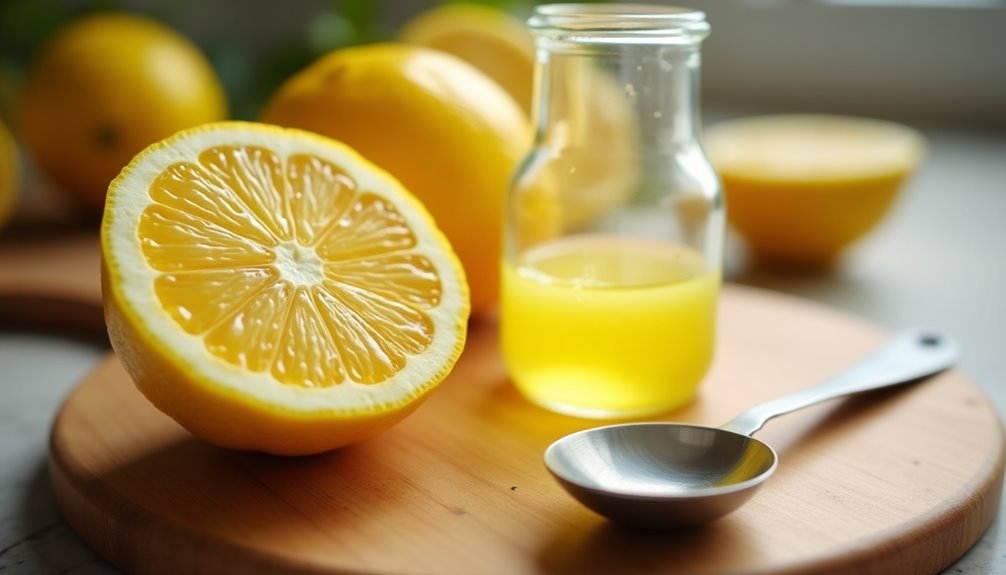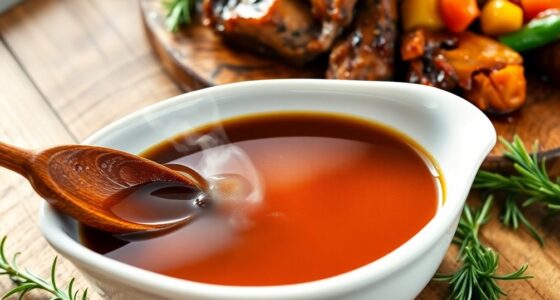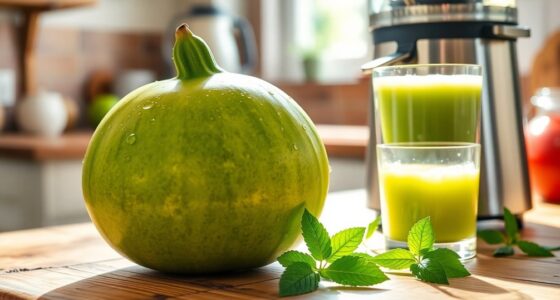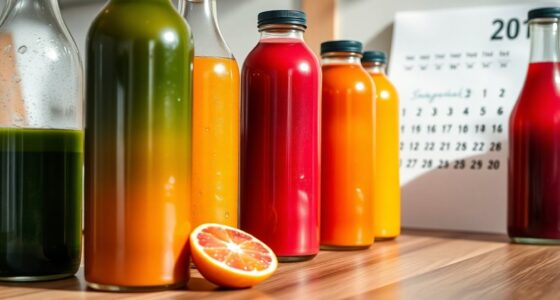To replace the juice of one medium lemon, you should use about 2 tablespoons of concentrated lemon juice. Remember, concentrated juice is roughly four times stronger than fresh juice, so start with a little less if you're unsure. As you adjust the flavors, you can always add more to taste. Fresh lemon juice has a brighter flavor, while concentrated juice may vary. There's much more you can explore about the differences and substitutions.
Key Takeaways
- One medium lemon yields about 2 to 3 tablespoons of fresh lemon juice.
- To substitute one lemon, use approximately 2 tablespoons of concentrated lemon juice.
- Concentrated lemon juice is about four times stronger than fresh lemon juice.
- Adjust other flavors in recipes when using concentrated lemon juice for balance.
- Taste as you go to achieve the desired flavor, as concentrated juice can differ in taste.

Have you ever wondered how much lemon juice concentrate you need to replace the juice of a fresh lemon? If you're in the middle of a recipe and don't have any fresh lemons on hand, using concentrated lemon juice can be a lifesaver. You might find yourself reaching for that bottle of lemon juice from concentrate, but it's essential to know how to substitute it correctly to maintain the flavor and integrity of your dish.
Typically, one medium lemon yields about 2 to 3 tablespoons of fresh lemon juice. So, if a recipe calls for the juice of one regular lemon, you can replace it with concentrated lemon juice. However, since concentrated lemon juice is roughly four times stronger than fresh lemon juice, you don't need to use as much. To equal the juice from one lemon, you'll want to use about 2 tablespoons of concentrated lemon juice. This substitution works well for most recipes, whether you're making a salad dressing, a marinade, or a delightful dessert.
When you're substituting concentrated lemon juice, it's also worth noting that the flavor might differ slightly from fresh squeezed lemon juice due to the processing involved. While concentrated lemon juice is convenient, the fresh, bright taste of fresh lemons can sometimes be irreplaceable, especially in recipes where lemon is the star ingredient.
If your recipe calls for a fresh lemon, and you're using concentrated lemon juice instead, it's a good idea to taste as you go. You might find that you need to adjust other flavors in your dish to accommodate the concentrated lemon juice.
If you need just a touch of acidity, you can also start with one teaspoon of lemon juice concentrate and gradually add more to taste. This way, you can control how much lemon flavor you're introducing into your dish.
Keep in mind that different brands of concentrated lemon juice may have slightly different flavor profiles, so checking the product label for specific measurement recommendations is a smart move.
Frequently Asked Questions
How Much Concentrated Lemon Juice Is Equivalent to One Lemon?
When you're trying to substitute concentrated lemon juice for fresh lemons, remember that concentration matters.
You'll typically need about 1/2 to 3/4 tablespoon of concentrated lemon juice to replace one medium lemon. Since concentrated juice is much stronger, this smaller amount captures the essence of a lemon's flavor.
Always check the label, too, since different brands can vary in strength. Fresh juice usually tastes better, but concentrated juice can work in a pinch!
Can You Substitute Bottled Lemon Juice for Fresh Lemon Juice?
Yes, you can substitute bottled lemon juice for fresh lemon juice. Just remember, the flavor might differ slightly, so you may need to adjust based on your taste preferences.
Generally, you can use the same amount by volume. However, for recipes that really rely on that fresh lemon flavor, using fresh lemons is usually best.
Always check the product label for specific instructions, as concentrations can vary by brand.
How Much Lemon Juice Concentrate Equals Half a Lemon?
To substitute for half a lemon, you'll need about 1 to 1.5 teaspoons of lemon juice concentrate.
Since the concentrate's flavor is stronger than fresh juice, it's wise to start with the lower amount and adjust to your taste.
Always check the product label, as concentration levels can vary.
Taste testing is a great way to ensure you achieve the desired flavor balance in your dish or drink.
What Does 100% Lemon Juice From Concentrate Mean?
When you see "100% lemon juice from concentrate," it means the juice has been processed to remove water and then rehydrated to restore its strength.
You can enjoy a similar flavor profile and acidity as fresh lemon juice, though it might lack some nutrients. This type of lemon juice is convenient and shelf-stable, making it a popular choice for cooking and baking.
Just remember, the heating process can slightly alter its flavor.
Conclusion
In summary, when you’re out of fresh lemons, remember that 2 tablespoons of lemon juice concentrate equals one medium lemon. This handy substitution can save you time and hassle in the kitchen. Interestingly, did you know that the average lemon contains about 3 tablespoons of juice? So, using concentrate can actually help you avoid waste while still achieving that zesty flavor in your recipes. Keep this tip in mind for your next culinary adventure! Additionally, if you find yourself in a situation where you’re cooking or baking and don’t have any fresh lemons on hand, this lemon juice from concentrate measurement can be a real lifesaver. It’s also worth noting that lemon juice concentrate often has a longer shelf life than fresh lemons, making it a convenient staple to keep in your pantry. So, whether you’re making salad dressings, marinades, or desserts, this substitution will help you maintain that vibrant citrus flavor without the pressure of rushing to the store.
Cindy thoroughly researches juicing trends, techniques, and recipes to provide readers with practical advice and inspiration. Her writing style is accessible, engaging, and designed to make complex concepts easy to understand. Cindy’s dedication to promoting the advantages of juicing shines through her work, empowering readers to make positive changes in their lives through the simple act of juicing.

















